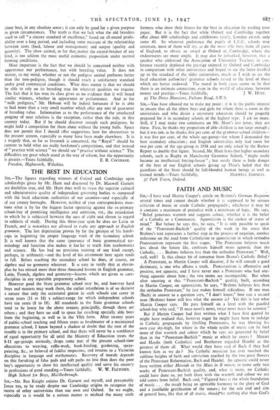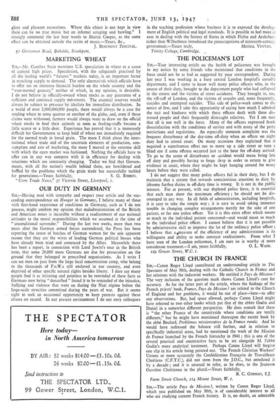FAITH AND MUSIC
Sta,—I have read Martin Cooper's article on Brahms's German Requiem several times and cannot decide whether it is supposed to be serious criticism of music or crude Catholic propaganda ; whichever it may be it contains a maximum of prejudice with a minimum of logic. He says, " Belief generates warmth and suggests colour, whether it is the belief of a Catholic or a Communist. Agnosticism is the coolest of states of mind." But before he says this, he says, " It is only possible to speak of the 'Protestant-Bachish ' quality of the work in the sense that Brahms's text represents a further step in the process of negation, another milestone on the road from Catholicism to agnosticism in which orthodox Protestantism represent the first stages. The Protestant believes much less about the future life, confesses himself more agnostic than the Catholic, . . . Brahms believes less than the orthodox Protestant." Well, well, well! Is this choice bit of nonsense from Bruno's Catholic Belief ?
A Protestant, as Martin Cooper will discover, if he will consult a good dictionary, is one who affirms a truth. Protestantism is affirmative and positive, not agnostic, and I have never met a Protestant who had any- thing agnostic about him ; the two terms are incompatible. But when after sneering at this " Protestant-Bachish " quality, built, according to' Martin Cooper, on agnosticism, he says, "Brahms believes less than the orthodox Protestant," he just makes himself ridiculous. If one man (Bach) in answer to a question says, " I don't know," how can a second man (Brahms) know still less what the answer is? Yet this is lust what Martin Cooper says. He puts himself on a level with the puzzled school-boy who said, " If once nowt's nowt, twice nowt must be summat."
But if Martin Cooper had first written what I have first quoted he might have realised that, however eager he might have been to indulge in Catholic propaganda by libelling Protestants, he was blowing his own case sky-high, for where in the whole realm of music can he find more of that warmth and colour which he says are generated by belief than in the "Protestant-13achish " music at which he sneers ? Mozart and Haydn (both Catholics) and Beethoven regarded Handel as the greatest of them all. What would they have said of Bach if they had known him as we do ? No Catholic musician has ever touched the sublime heights of faith and conviction reached by the two great flowers of the Protestant Reformation, Bach and Handel. An agnostic could never have written either Messiah or the MaSs in B minor, to name only two works of Protestant-Bachish quality, and, what is more, no Catholic could have done so, yet both blaze with the warmth and colour we are told comes from belief. Bach said, " Figured bass is the whole foundation of music . .. the result being an agreeable harmony to the glory of God and a justifiable gratification of the senses ; for the sole end and aim of general bass, like that of all music, shouldthe nothing else than God's
glory and pleasant recreations. Where this object is not kept in view there can be no true music but an infernal scraping and bawling." I strongly commend the last four words to Martin Cooper, as the same effect can be obtained outside the realm of music.—Yours, &c., so Grosvenor Road, Virkdale, Southport.
J. BEAUMONT PERCIVAL.



































 Previous page
Previous page